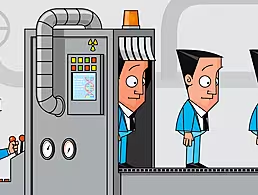Francesca Leithold, chief operating officer at Epro, discusses what it’s like to work in health informatics during a pandemic.
Dr Francesca Leithold joined digital clinical-services company Epro when she moved to the UK from Germany in 2014. She started out as a usability expert and product specialist and since then has been appointed the company’s chief operating officer (COO). Here, she reflects on her career path to date and explains why she’s still passionate about her work.
What does your role at Epro involve?
When we discussed my role recently, I joked with Bob, our CEO, that my real job title should be CCH – chief cat herder – instead of COO, because I interface with almost all teams on a daily basis. I coordinate resources and ensure we deliver what the customer has agreed with us and what we have set out to achieve internally.
Because we’re a small but growing company, quite a variety of different tasks come my way. I fundamentally believe that to manage a project and the delivering teams successfully, it is essential to understand the tasks that are completed by the individuals. I have never written any code (the developers thank me for that!) but I try to get involved in a good amount of the groundwork. Reading through the code with some of the developers is totally on the menu.
We review all customer support issues with the support team every morning, bringing me close to ongoing projects and the work to be undertaken there. There are usually multiple customer projects going on at the same time and recently we have been busier than ever, delivering support to the NHS during the Covid-19 pandemic, particularly to one of London’s biggest NHS trusts.
Within the first few days of the pandemic, we ensured that inpatient flow and hospital care were streamlined across the hospital. This included implementing specific alerts, reconfiguring wards and integrating lab results for Covid-19 into our product, updating patient data in real time.
Did you always want to work in the field?
I came to health informatics rather unexpectedly, but maybe not surprisingly so. From an education perspective, I’m an all-rounder rather than a specialist – computer science and information processing, linguistics, management, and politics were all part of my curriculum.
One of my main interests was how software can support people, so I took that with me when I set out to do my PhD at Munich School of Management, which focused on usability, software ergonomics and performance factors of distributed teams using digital means and gamification.
Purpose and the greater impact of what we do in life with our career is important to me, so I took some time off after my PhD to consider where to go from there and what my options were. I wanted to make a difference somewhere. Travelling abroad, I met some British people who invited me over to stay with them for a bit. One of them worked at Epro, introduced me to the company and the rest is history.
What do you enjoy most about your job?
In all my time at Epro, I have never been bored for a single day. It’s a fast-paced environment and we have a lot of different customers with different needs; juggling several projects at any one time while looking after the internal bits and pieces makes for a demanding but rewarding job.
We deliver a solution to the NHS that makes patient care safer, faster and more reliable. I see the purpose of what we do every day. Patient letters go out faster, drug prescribing is safer, fewer errors are being made in clinics and medical staff have more time to look after their patients.
Digitising patient records and eliminating the need for paper-based case notes has saved the NHS millions of pounds and enabled thousands of clinicians to spend more quality time with their patient and less time digging around a paper file.
What have been your biggest challenges and how did you navigate those?
One of the challenges I quite often come across is due to the size of the company. Epro is growing, but because we’re still somewhere around start-up size, people in all teams wear many hats in their day-to-day job. For example, professional and technical services deliver projects, represent support, create documentation, liaise with the release team, speak to development and get involved in testing and Q&A.
Having dedicated meetings with the relevant teams on a regular basis helps open communication channels and ensures everyone is on the same page. As a bonus, sticking to the timescales for these meetings considerably improves staff morale.
‘I had situations where the customer mistook me for the ‘coffee lady’ in onsite meetings. It does show how gender bias takes place without great fanfare and without malice’
– FRANCESCA LEITHOLD
On a more general note, the technology companies and the IT departments in NHS Trusts we work with are still predominantly run by white men, with a majority of male employees. This isn’t always their fault; the number of female applicants for technical jobs we have seen here at Epro has been very limited. In many cases, women still choose less tech-heavy career paths, leading to an underrepresentation of female employees.
Consequently, subconscious bias seems to be very common. While I have never encountered any challenges at Epro based on gender, I had situations where the customer mistook me for the ‘coffee lady’ in onsite meetings. It does show how gender bias takes place without great fanfare and without malice.
To address this, there is sometimes a requirement to be a little bit extra-prepared, when you are (the woman) in charge of a project or task, to have done just that small bit more reading than your (male) colleagues.
What advice would you give someone interested in working in a role similar to yours?
Persist. Have an idea of what you want to do and stick with it. If there is anything in your career you want to achieve, don’t let anyone tell you that you can’t.
For the women among us, go the extra mile and be extra dedicated. You will set an example for other women, thus driving change and making the workplace more equal by encouraging them to go for a similar career path. Don’t compare yourself to others too much, but be yourself and be as authentic as you can.
If you lead a team, be transparent. Be convinced of what you do, why you do it and communicate this accordingly. I strongly feel that if people understand why they have been given a task, they will do it better. Definitely ensure there is someone owning the project or task and is accountable. Engage people according to their strengths in different tasks and give them room to thrive. Don’t micromanage.
Most important of all, from time to time, check in with yourself that what you set out to do is still what makes you happy. If it isn’t, it is OK to change things and do something else instead. Accept who you are, what your strengths are and make the most out of them. It’s your career – make it shine.




